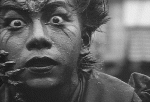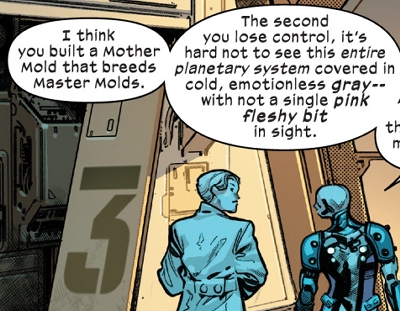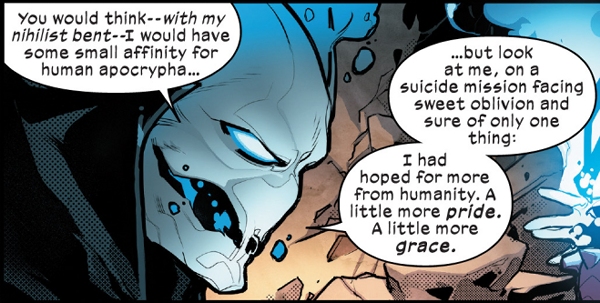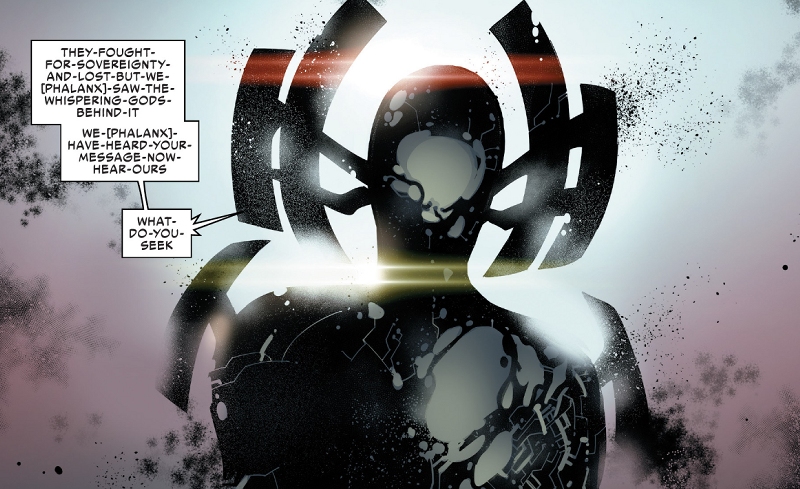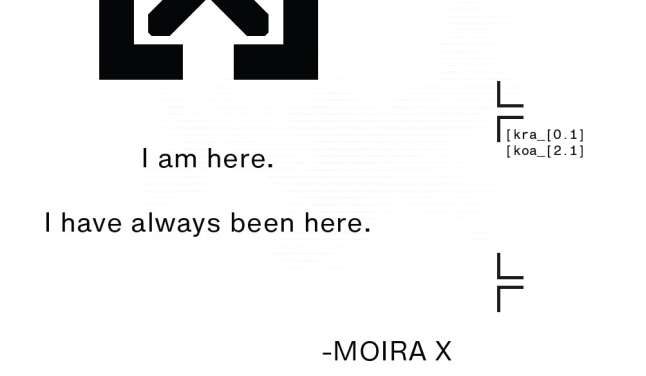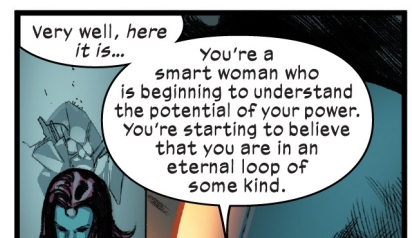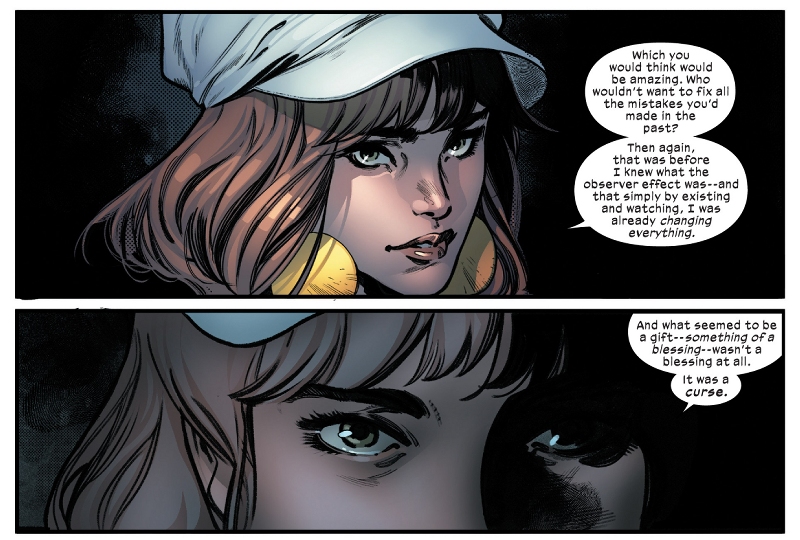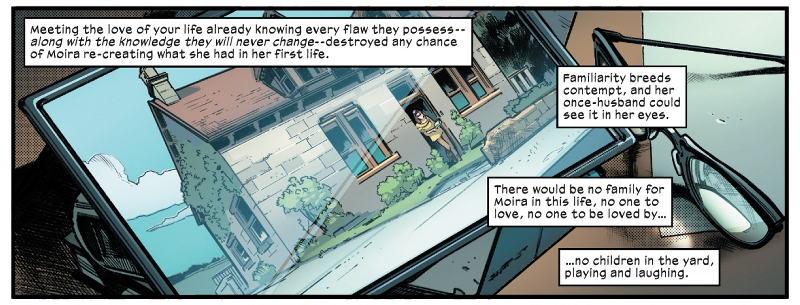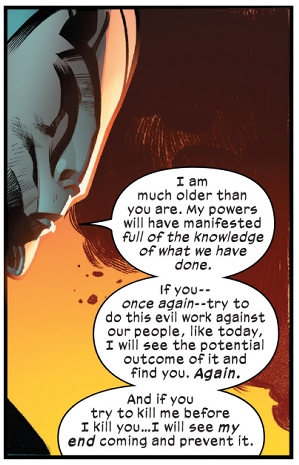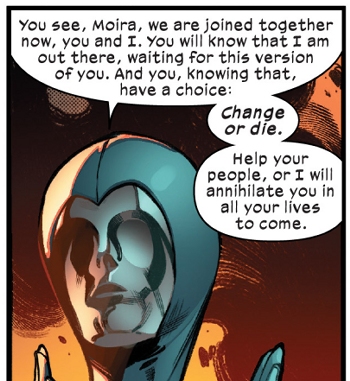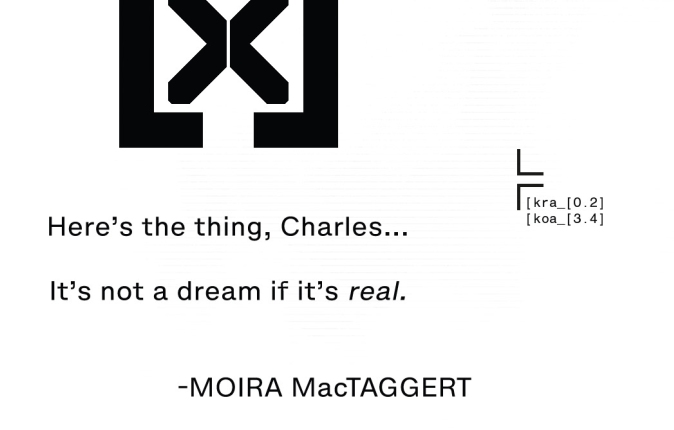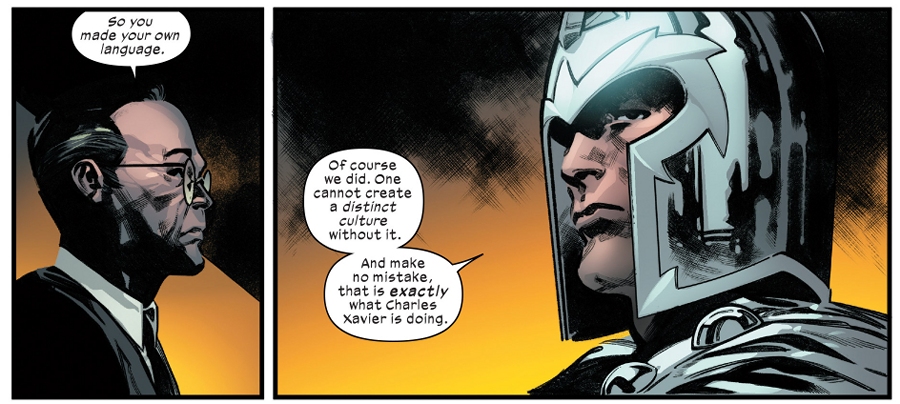I did skip a week but because I was busy at the time when I was supposed to write these updates, then I lost the moment and I didn’t have all that much to say either. Now I can’t even remember what I thought about that previous issue.
In general these last two haven’t offered a lot of meaningful material. It might be good, having a little more space to focus on the same group of characters instead of jumping all over the place, but the result isn’t convincing at all.
If House of X #4’s purpose is to amp up the drama then the only dramatic effect is its failure in doing so. After we jumped between timelines and different realities, and with the worsening effect of old characters behaving so oddly, it’s impossible to feel within the story and care about what is going on. In the great picture this is just a perfunctory scene within a larger process where worlds are destroyed and recreated. A casualty feels little more than a distraction, especially when it’s so rhetorically hollywoodean and bombastic. The only things that it leaves me are little nonsequiturs, like why is Mistique caught during an infiltrating operation without even a disguise? I guess there’s probably some banal explanation, but it feels like stuff just happens at random and it’s better to move on than ask questions.
Dialogues are getting worse and worse. We get didascalic character descriptions thrown in the worst possible situation and so gratuitous that they just move back and forth between the cringe and the fastidious.
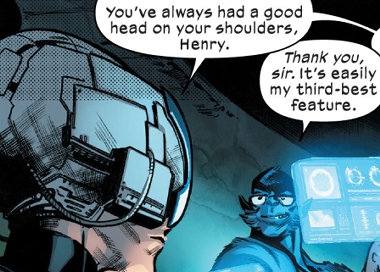
Oh, and of course the cliffhanger of the previous issue was for the most part a fraud. Only a couple minor casualties for some unimportant background characters (husks). Wolverine regenerating a whole arm within seconds (uhm, how’s that “accelerated” healing?). I wonder what’s the point of doing arbitrary damage like that if it’s then gone in two panels, beside that bland shock value and the feeling of reaching and artificiality. But oh, it’s to justify the implausible scene that follows a few pages later, where Wolverine regenerates everything in real time while Nightcrawler gets obliterated in a millisecond. Then rhetoric and then more rhetoric, because Hollywood requires melodrama. You’ve seen this a million times already, usually executed a lot better.
The only two lines of dialogue that actually do make sense are spoken by a sentinel gone raving mad.
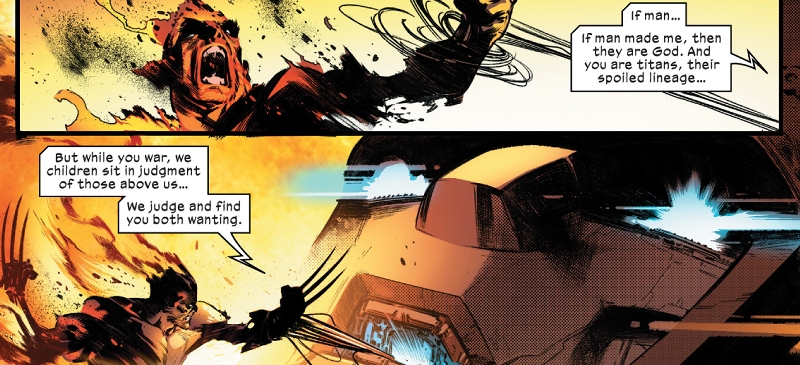
I guess the whole purpose is to convince the readers that the stakes were very high if Xavier decided that everyone in the squad was expendable. It’s a bit like the classic “show don’t tell” mantra. We see that Xavier is willing to pay the price, and so deduce the importance of it all, but it’s all still to be accepted without any question. The motivation given, about Nimrod’s origin, is anything but conclusive, so we simply watch Xavier making bold choices without any real access to the process leading to them. Mysterious Xavier can’t explain himself without giving everything away, so we’re all left hanging from unexplained explainers. And expected to be on board with those choices and consequences.
The more the intensity of the drama is ramped up, and failing, the greater the disconnection. It all falls flat and feels so fake. Why should anyone care about Wolverine’s death, when we’ll be jumping to a brand new version of himself in no (reader) time? In the flux of the transition the permanence of death has no hold, and on the reader as well. These fakedly dramatic deaths just wash away and leave no trace. Beside the cringe worthy rhetoric there was a whole lot of nothing.
Same for the following and current issue. The lengthy scene at the beginning is just one big question mark. It’s very random, very unfunny, and if anything it also helps to augment the disconnection between me reading and this meandering, pointless story. If Sinister is just random, Xavier and Magneto are worse than caricatures. The effect is like nails on a blackboard.
But who’s the brainwhashed mutant Sinister replaced? I wish I cared.
Follows a filler scene between Xavier and Cypher to fill an unnecessary gap about the discovery of Krakoa and the development of the language related to it. There’s one element that’s not filler, and it’s some piece of mythology that reveals Krakoa is also related to Apocalypse. It seems important, but it adds up to nothing else. So it’s another gaping hole with no current relevance. More promises of deliveries undelivered. Until these pieces remain unconnected, they are as good as blanks. They aren’t titillating mysteries to solve, they are just gratuitous hubris. The fact that they might eventually contribute to the shape of a puzzle doesn’t justify the hacked off nature of the delivery. A piece needs to be interesting on its own, THEN also connect meaningfully to something more. Instead we just get ineffective baits.
And finally the last scene delivers a micron of progress about the most current outward extremity of this puzzle. It follows the 4th issue. Some unnecessary exposition explains that the Phalanx entity can only absorb data and machinery, but this feels extremely dissonant since the whole concept was introduced through evolutionary ideas, the Phalanx entity described as “predatory”. Now it turns out it’s purposeless toward “organicity”? So is organic life a singularity in the universe, and machines the norm? …How? These are just bad ideas with poor foundations. Hickman just goes with the most pedestrian concepts of AI and machinic fears, ends up with the fundamentals gone all wrong. Might require one or more philosophy classes if one intends to tackle similar themes.
But in any case these future people made some computery copies of themselves in the hope that the Phalanx overlords will be lured to absorb those, and leave the actual organic sources untouched.
Of course.
They aren’t entirely sure the plan is going to work, which makes for another ineffective cliffhanger, not every day you try to trick an alien being with the power of a million of evolved minds, with one of the most idiotic ideas a single comic writer came up with during a night of drunken stupor. But beside this, wasn’t all this already implied in the premise? You can’t feed a computer to a cat. In fact a computer to a cat is so uninteresting that they just don’t register its existence. Out of taxonomy and language. Background noise.
That’s part 8 of 12 and it’s still all arbitrary and moving on top of an hidden course. If the last issue retroactively justifies the journey, and that’s already a lofty goal, it still wouldn’t have made it enjoyable.
The next issue is one of those marked “red”. I guess we’ll see, whatever there is to see.
